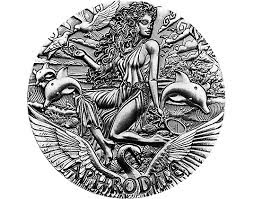Aphrodite, the beautiful goddess of love, was the only Olympian who had neither mother nor father. Nobody knew from where she had come. The West Wind had first seen her in the pearly light of dawn as she rose out of the sea on a cushion of foam. She floated lightly over the gentle waves and was so lovely to behold that the wind almost lost his breath. With soft puffs, he blew her to the flowering island of Cythera, where the three Graces welcomed her ashore. The three Graces, goddesses of beauty, became her attendants. They dressed her in shimmering garments, be- decked her with sparkling jewels, and placed her in a golden chariot drawn by white doves. Then they led her to Olympus, where all the gods rejoiced in her beauty, seated her on a golden throne, and made her one of them.
Zeus was afraid that the gods would fight over the hand of Aphrodite, and, to prevent it, he quickly chose a husband for her. He gave her to Hephaestus, the steadiest of the gods, and he, who could hardly believe in his good luck, used all his skill to make the most lavish jewels for her. He made her a girdle of finely wrought gold and wove magic into the filigree work.
That was not very wise of him, for when she wore her magic girdle no one could resist her, and she was all too irresistible already.
Aphrodite had a mischievous little son whose name was Eros. He darted about with a bow and a quiver full of arrows. They were arrows of love and he delighted in shooting them into the hearts of unwary victims. Whoever was hit by one of his arrows fell head over heels in love with the first person he saw, while Eros laughed mockingly.
Once a year Aphrodite returned to Cythera and dived into the sea from which she had come. Sparkling and young, she rose from the water, as dewy fresh as on the day when she had first been seen. She loved gaiety and glamour and was not at all pleased at being the wife of sooty, hardworking Hephaestus. She would rather have had his brother Ares for her husband.
Zeus was afraid that the gods would fight over the hand of Aphrodite, and, to prevent it, he quickly chose a husband for her. He gave her to Hephaestus, the steadiest of the gods, and he, who could hardly believe in his good luck, used all his skill to make the most lavish jewels for her. He made her a girdle of finely wrought gold and wove magic into the filigree work.
That was not very wise of him, for when she wore her magic girdle no one could resist her, and she was all too irresistible already.
Aphrodite had a mischievous little son whose name was Eros. He darted about with a bow and a quiver full of arrows. They were arrows of love and he delighted in shooting them into the hearts of unwary victims. Whoever was hit by one of his arrows fell head over heels in love with the first person he saw, while Eros laughed mockingly.
Once a year Aphrodite returned to Cythera and dived into the sea from which she had come. Sparkling and young, she rose from the water, as dewy fresh as on the day when she had first been seen. She loved gaiety and glamour and was not at all pleased at being the wife of sooty, hardworking Hephaestus. She would rather have had his brother Ares for her husband.


Comments
Post a Comment